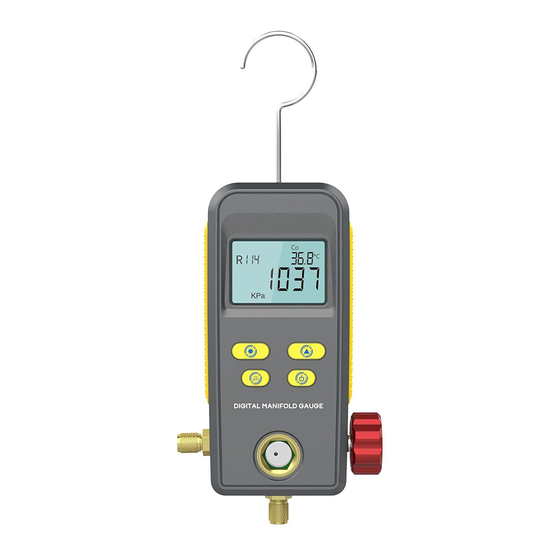Autool LM110 Manuel de l'utilisateur - Page 3
Parcourez en ligne ou téléchargez le pdf Manuel de l'utilisateur pour {nom_de_la_catégorie} Autool LM110. Autool LM110 12 pages. Digital manifold gauge

1. Overview
This is an auxiliary instrument for installations, testing and maintenance of
refrigeration equip-ment such as air conditioners and cold storage. It comes with
three main functions with digital readings and multi-unit switching. Build-in 89
refrigeration database drives it provide much more accurate readings.
High-strength engineering plastic and flexible non-slip silicone make instrument solid
and comfortable to hold.
Build-in 32-bit digital processing unit and high precision data acquisition unit make
instrument efficient and stable.
Large size LCD display and backlight support test reading clear and operation in dark
condition.
Heavy duty valve switch and 1/4 inch inlets ensure instrument durable and versatile.
Build- in 89 types of refrigeration database eases user check condensation
temperature and evapor-ation temperature intelligently.
Vacuum Test and Pressure Leak Test with leak time recording perfectly match users'
needs of pressure test and measurement in the process of filling refri-gerant.
2. Safety Rules and Precautions
This manual includes instructions and precautions for operation and maintenance.
Failure to use the instrument in accordance with this manual could cause damage to
instrument. Design and produc-
-tion strictly follow IEC/EN61010-1 safety standard.
1) The pressure measured by instrument is gauge pressure.
2) Pressure testing ranges from -101Kpa to 6Mpa (-0.1bar to 60bar).
3) Limit pressure is 10Mpa(100bar).
4) Maximum operation pressure of standard hose is 600 PSI(approximate 4.13Mpa,
41.3bar). The limit pressure is 3000PSI ( approximate 20.68Mpa, 206.8bar).
5) Please confirm the rated pressure value of the tested equipment before testing.
Do not use it if it exceeds the range of the instrument. If the packed hose does not
match the pressure requirement, other suitable replacements are available for test.
6) Do not use or store the instrument in fields with high temperature, high humidity,
flammable, explosive or strong electromagnetic.
7) Do not revise internal circuit of the instrument to avoid any damage to it or danger
occurring.
8) Please wear qualified protective equipment during testing.
9) Please use the instrument in a well-ventilated environment to prevent inhaling
toxic gases.
2
